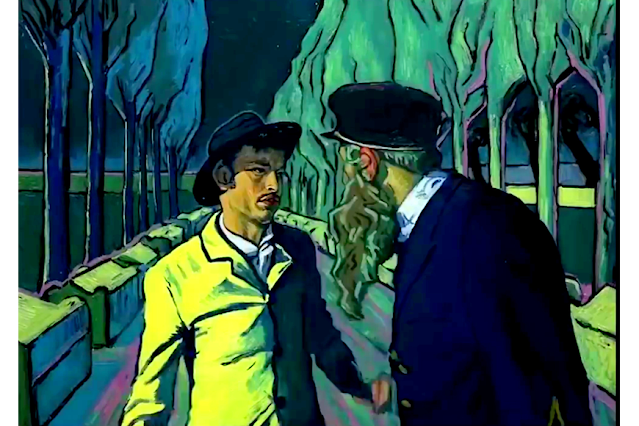Loving Vincent
Technique alone. That may be reason enough to watch 2017's LOVING VINCENT, the world's first feature to be comprised entirely of moving paintings. Over one hundred oil painters were recruited to recreate the works of Vincent Van Gogh, with adjustments of their familiar images for light and shade, depending on where the sun may be (or not) for a particular scene. Directors Dorota Kobiela and Hugh Welchman shot live action which was later rotoscoped with the artists hand painting each frame, an endeavor that took four years. As incredibly detailed as this movie is, that seems like a conservative report. The bursts of color, the cascades of wind rustled leaves and rain drops are astonishing at times.
That astonishment does wain here and there as the screenplay - which considers the death of the titular artist - is far less ambitious than said technique. It in fact resembles the plot of a 1970s television crime drama, complete with a frazzled (would be) detective (Armand, son of a postman who shuttled letters between Vincent and his brother Theo) questioning those who saw the painter in his last days, and most of whom are portrayed with enough hint of suspicion to make them potential murder suspects.
Ah, but wasn't Vincent Van Gogh reported to have commited suicide? Can't be, saith one of the artist's medical doctors, since the bullet wounds suggest firing from further away than even an outstretched hand could manage. Was the assailant Adeline Ravoux, who plays fast and loose with the truth as she recounts Vincent's time at her father's hotel? Or perhaps Rene, a local young ruffian known to tease Vincent? Dr. Paul Gachet, who took the troubled artist into his home and befriended him? And how does Vincent's brother Theo fit in this scenario?
There is a certain engagement with the story, its events based on fact. A classic tortured artist tale with embellishments, I'm sure, though what is embellished I'm not so sure. There are many tellings of the lives of Vincent and Theo, including a movie directed by Robert Altman. The directors' script dutifully traces their steps, and has each character questioned by Armand recounting their interactions in flashback (done in black and white oil). But dramatically, LOVING VINCENT suffers from lethargy at times. The characters are just not that interesting. The constant flashback structure is also tiresome.
But the style again is the substance. The shifting brushstrokes evoke emotional responses that hint of the beautiful real life tragedy that unfolded one hundred and thirty years ago. They, as with many other such mysteries of pure art, are almost impossible to put into words. Living and breathing yet so artificial. Light as air, almost inconsequential, yet as weighty and monumental as anything can possibly be. There's a real sadness in the stunning visuals, a beautiful sadness that carries LOVING VINCENT past its shortcomings.



Comments